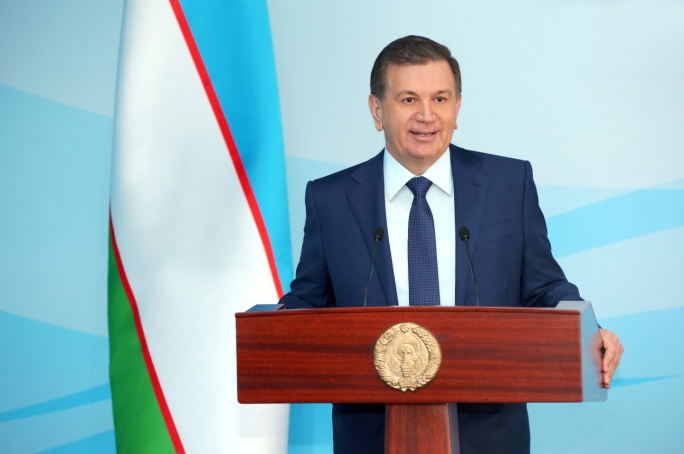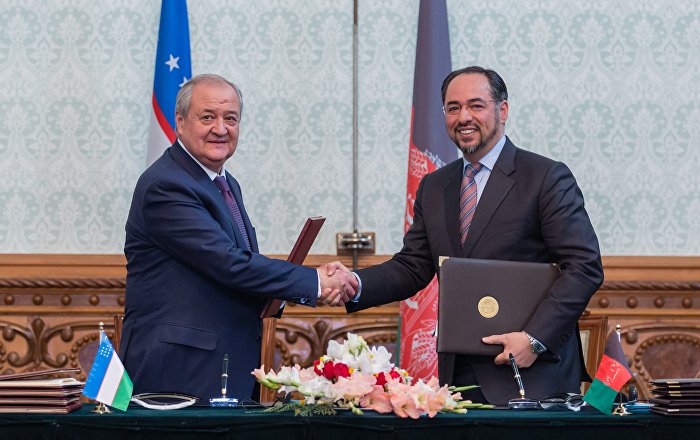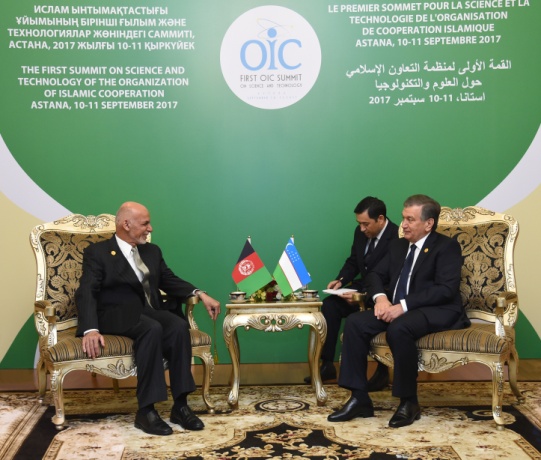I. Rapid changes in the international situation, intensification of interstate collisions, further escalation of tensions as well as the emergence of new conflict outbreaks in various regions of the world today are inducing anxiety and concern of the international community.
Under these circumstances, the problem of intra-Afghan struggle settlement remains one of the vital issues of ensuring regional and international security. As the analysis shows, the military and political situation in the country remains rather complicated and ambiguous for many years. Additional pressures are created by an accelerated withdrawal of the larger half of the International Security Assistance Forces, as well as a subsequent reduction in external financial support. The situation is increasingly worsened by the growing rivalry of external forces within and around Afghanistan.

Natural result, the vacuum in the realm of country`s security created after the reduction of foreign forces – is causing the negative consequences currently observed in all spheres of life in Afghanistan. Hence, in order to overcome the current situation in the country, the country`s administration is taking a number of political, economic and security measures. At the same time, taking into consideration the available resources in Afghanistan, the prospect of Kabul's independent resolution of the contradictions and problems accumulated in the country is unfortunately unseen.
II. In this regard, according to the approaches of the Republic of Uzbekistan to the settlement of the situation in Afghanistan, the solution of the afghan crisis seems unattainable without taking into account the following main factors.
First, the settlement of the Afghan conflict is possible only on the basis of intra-Afghan national consensus, by means of peaceful political negotiations between the main warring parties and the Taliban movement under the auspices of the United Nations, without any preconditions. It is necessary to provide the independence and sovereignty of Afghanistan, to confirm the Afghan identity, history, mentality, culture and traditions that can become the key to success in the modern stable state building.
Second, the emerging situation dictates the need to search for possible points of interaction and compromise solutions, first of all, considering interests of the people of Afghanistan and the region as a whole. All involved parties must develop common principal approaches to solve the Afghan problem as well as practical mechanisms for their implementation. The efforts of all interest groups should not substitute but complement each other.
Third, it is extremely important that the donor countries and international institutions confirm their commitments to provide assistance to Afghanistan aimed at real improvement of the social and economic situation in the country and the living standards of the population. Subsequently, the concentration of the international community's efforts to create the economic infrastructure necessary for Afghanistan can have a stabilizing effect on the military conflict.
In this context, the statement of the President of the Republic of Uzbekistan Mirziyoyev Shavkat Miromonovich attracts attention that "the transition of Afghanistan to peaceful lines largely depends on its economic development, in which the countries of our region can and should take part. Of course, joint infrastructure projects in Afghanistan can play a huge role here. Including the development of a trans-Afghan transport corridor, which will also have a positive impact on the countries of the region to reach the ports of South Asia, the Persian Gulf and the Middle East."

The establishment of peace in Afghanistan will bring enormous and noticeable benefits to all countries of the Eurasian continent. Sustainable peace and stability in the country will stimulate the construction of roads and railways, development of regional and trans-regional trade and arranging pipeline networks in all directions.
In this regard, as the head of the Ministry of Foreign Affairs of the Republic of Uzbekistan, A.Kh.Kamilov, emphasized, "the international community should start looking at Afghanistan not as a source of regional problems, threats and challenges, but rather a unique strategic opportunity capable to break the established status quo once and for all, shape the fundamental and solid grounds for a multilateral interaction, which will serve the goals of our common prosperity and well-being
In this context, analysts highlight that Uzbekistan's participation in the design and construction of the Mazar-i-Sharif-Shibergan-Maymana-Herat railway will contribute to the quick recovery of Afghanistan's economy."
III. In the Concept of Foreign Policy of the Republic of Uzbekistan, the development of friendship and cooperation with neighboring countries is recognized as the most important priority of the country's foreign policy. The head of our state, Shavkat Miromonovich Mirziyoyev, in his speech at the inauguration ceremony of the President of Uzbekistan distinguished that "close cooperation with foreign countries, primarily with neighboring countries, will be conducted on the level of modern requirements, based on the principles of mutual trust and bearing in mind the mutual interests. Uzbekistan invariably remains committed to an open, benevolent and pragmatic policy towards its closest neighbors
Of this subject, Uzbekistan's contacts with the neighboring countries have intensified recently, the spheres of productive partnership is steadily growing and expanding, contributing to the prosperity of our countries and the region in total. Special role in these processes is distributed to Afghanistan.
The Republic of Uzbekistan has traditionally pursued a good-neighborly friendly policy towards the Islamic Republic of Afghanistan, taking into account historical experience and strong commitment to long-term stability in this country. Uzbekistan adheres the principal policy based on generally accepted norms of international law of non-interference in the internal affairs of Afghanistan, non-participation in various military and political blocs, building and developing cooperation on a bilateral basis, taking into account the national interests of both countries and respecting the choice that the Afghan people will make about the future of their country.
It is essential to give emphasis to that Uzbekistan demonstrates its determination to help stabilize Afghanistan by participating in the implementation of specific projects for peaceful construction, the restoration of the economy of the neighboring state destroyed by the long-term war. In particular, "in November 2008, the Memorandum on the construction of the Hairaton-Mazar-i-Sharif railway was signed between ADB, Uzbekistan and Afghanistan. The construction works were completed in 2010. The railway has 106.5 km length of, while the length of the main roads is 75 km, the capacity of the line is 8 pairs per day or more than 9 million tonnes of cargo per year. At the request of the Afghan government, Uzbekistan has built 11 bridges and crossings on the Mazar-e-Sharif-Kabul road section.
"In 2008, the activation of cooperation between Uzbekistan and Afghanistan in the field of fiber-optic communication began tеhe official opening ceremony of which took place in July 2009 in Hairaton. The line connected the Republic of Uzbekistan and Afghanistan. After commissioning of the "Hairaton-Puli-Khumri-Kabul" Electric Supply Line - 220 in 2010, the electricity began to flow to the capital of the IRA from Uzbekistan.
The volume of electricity supplies to Afghanistan, taking into account the receiving capabilities of the Afghan side, has been doubled - from 150 to 300 MW."
Recently, cooperation between Uzbekistan and Afghanistan has reached new level. The impetus for new dynamics in bilateral relations was given after the meeting of the First President of our country Islam Abduganievich Karimov with the head of the IRA Muhammad Ashraf Ghani in June 2016 within the framework of the Tashkent SCO summit.
The following meeting of the Afghan leader with the President of Uzbekistan Shavkat Mirziyoyev on September 3, 2016 in Samarkand gave a fundamentally new quality to cooperation between the countries.
On January 23-24, 2017, on behalf of the head of our state, a representative delegation of Uzbekistan leaded by the Minister of Foreign Affairs Abdulaziz Kamilov paid an official visit to Afghanistan. "As a result of the visit, the following documents were signed:
1) Action Plan ("Road Map") on promoting further development of full-scale cooperation between Uzbekistan and Afghanistan in 2017;
2) Protocol on the intentions to further cooperation development in the field of transport infrastructure;
3) Memorandum of understanding between the foreign ministries of the two countries.
The implementation of the Action Plan will make it possible to increase trade turnover figures from the current USD 400 million to $ 1.5 billion in short period. During the visit, the Trade House of Uzbekistan in Kabul was opened, which was yet another confirmation of the commitment of the parties to intensify trade and economic cooperation."
On June 8, 2017, within the framework of the SCO summit in Astana, a meeting with the government representatives of Uzbekistan was held on the initiative of Afghan President A.Gani. During the meeting of Sh.Mirziyoyev and A.Gani, the sides outlined the priority areas of bilateral cooperation.
In this context, remarking the results of the meeting of Uzbek and Afghan presidents, the Minister of Foreign Trade of Uzbekistan E.Ganiev said that “the countries intend to bring the mutual trade to USD 1 billion by the end of 2017. In particular, agreements were reached on deliveries of the following nomenclature from Uzbekistan to the Afghanistan: up to 300 thousand tons of mineral fertilizers annually, 2 thousand units of agricultural machinery, up to 250 thousand tons of food wheat and other products in demand in Afghanistan”.

Another meeting of Sh.Mirziyoyev and A. Gani took place within the framework of the Organization of Islamic Cooperation Summit on science and technology in Astana on September 10, 2017. During the conversation the parties discussed the implementation of the “Road map” established during the June talks between the leaders. It was emphasized that the consistent fulfillment of the trade and economic cooperation between Uzbekistan and Afghanistan resulted in increase of the mutual trade volume by 18.5 percent in the first half of 2017.
In general, it should be noted that Uzbekistan will continue its practical assistance in creating the infrastructure of Afghanistan, considering this as an indispensable condition for promoting peace and prosperity in this country. The achievement of amity and stability in Afghanistan is a decisive factor not only for regional but also for global security, which opens up opportunities for solving vital problems of sustainable social and economic development for all states and peoples living in the region of Central Asia.
Mustafaev Bakhtiyor Rustamovich,
The head of department of the Institute for Strategic and Regional Studies under the President of Republic of Uzbekistan

